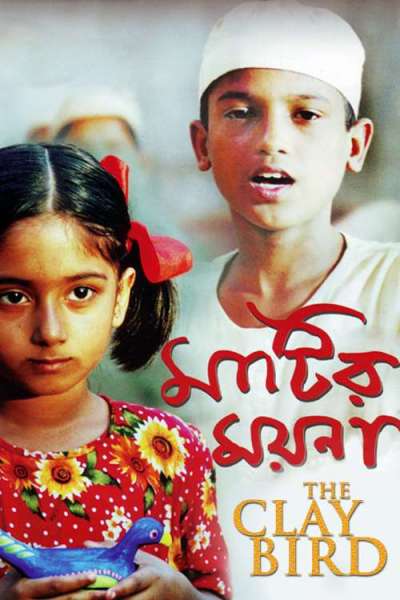The Clay Bird is a french film of genre Drama directed by Tareque Masud with Jayanta Chattopadhyay
The Clay Bird (2002)

If you like this film, let us know!
- Infos
- Casting
- Technical infos
- Photos
- Videos
- Film quotes
- Characters
- Music
- Awards
Length 1h34
Directed by Tareque Masud
OriginFrance
Genres Drama
Themes L'adolescence, Films about education, Films about children, Films about religion, Films about Islam, Films about school violence
Rating83%










Matir Moina (Bengali: মাটির ময়না; also spelled Matir Moyna and known in English as The Clay Bird) is a Bengali film directed by Tareque Masud, a Bangladeshi film director. The film was released in 2002. It was awarded the FIPRESCI Prize in section Directors' Fortnight outside competition at the 2002 Cannes Film Festival, and became Bangladesh's first film to compete for the Academy Award for Best Foreign Language Film.
Matir Moina deals with Masud's own experiences studying at a madrasah against the increasing tensions in East Pakistan culminating in the Bangladesh War of Liberation. Throughout the film there are references to historical occurrences in agitated times, and the film portrays these episodes through the human experiences of the young protagonist, his family, and his teachers and peers at the madrasah. Matir Moina won a number of awards internationally but was initially banned in Bangladesh on the grounds that it dealt with issues sensitive to the religious. The ban was repealed and the DVD version was released on April 16, 2005.
Synopsis
The film is set against the backdrop of unrest in East Pakistan in the late 1960s leading up to the Bangladesh War of Liberation. In this setting, a small family must come to grips with its culture, its faith, and the brutal political changes entering its small-town world. Anu, a young boy, is sent off to a madrasah by his unbendingly devout father Kazi. Anu's younger sister falls ill and dies because of Kazi's refusal to use conventional medicine. While at the madrasah, Anu befriends Rokon, an eccentric misfit in the rigorous religious school, who is forced by the teachers to undergo an exorcism by ducking in the freezing river to cure himself.Actors

Jayanta Chattopadhyay
(Kazi)

Rokeya Prachy
(Ayesha)
Comments
Leave comment :
Suggestions of similar film to The Clay Bird
There are 15 films with the same actors, 7 films with the same director, 61787 with the same cinematographic genres, 5851 films with the same themes (including 0 films with the same 6 themes than The Clay Bird), to have finally 70 suggestions of similar films.If you liked The Clay Bird, you will probably like those similar films :

Homeland (2005)
, 1h25Directed by Catherine Masud, Tareque Masud
Origin Bangladesh
Genres Drama
Actors Sara Zaker, Jayanta Chattopadhyay, Rokeya Prachy
Rating76%





Ontorjatra (literally meaning "inner journey") is an Bengali intimate exploration of the complex issues of dislocation and identity in a diasporic world. After 15 years in the UK, Shireen and her son Sohel return to their home in Sylhet, Bangladesh for the funeral of Sohel's father. For Shireen the homecoming allows her to make peace with her ex-husband and his family, for Sohel, the journey allows him to connect with a family and a "homeland" he has never known.

Runway (2010)
, 1h30Directed by Tareque Masud
Origin Bangladesh
Genres Drama, Thriller
Actors Jayanta Chattopadhyay, Nusrat Imroz Tisha
Rating81%





Ruhul, a young frustrated boy lives in a small hut near an international airport.

Carrie (2002)
, 2h12Directed by David Carson, David Carson
Origin USA
Genres Drama, Thriller, Fantastic, Horror
Themes L'adolescence, Films about education, Films about children, Films about religion, L'enfance marginalisée, Films about school violence
Actors Angela Bettis, Patricia Clarkson, Jodelle Ferland, Rena Sofer, Kandyse McClure, Emilie de Ravin
Rating54%





Several people are being interviewed in a police station, including high school senior Sue Snell (Kandyse McClure) and gym teacher Miss Desjardin (Rena Sofer). Detective John Mulchaey is investigating the disappearance of high school senior Carrie White (Angela Bettis).

Carrie (1976)
, 1h38Directed by Brian De Palma
Origin USA
Genres Drama, Thriller, Fantastic, Horror
Themes L'adolescence, Films about education, Films about children, Films about families, Feminist films, Medical-themed films, Psychologie, Films about religion, L'enfance marginalisée, Films about psychiatry, Political films, Films about school violence
Actors Sissy Spacek, Piper Laurie, Amy Irving, William Katt, John Travolta, Nancy Allen
Rating73%





Carrie White (Sissy Spacek), a shy and friendless 17-year-old girl, is the scapegoat and outcast of her school in North Carolina. At home, she is abused by her mentally unstable mother Margaret (Piper Laurie), who is a Christian fundamentalist.

A Friend to Die For (1994)
, 1h27Directed by William A. Graham
Origin USA
Genres Drama, Crime, Politic
Themes L'adolescence, Dance films, Films about education, Films about children, Films about religion, Sports films, Films about school violence
Actors Kellie Martin, Tori Spelling, Valerie Harper, Margaret Langrick, Marley Shelton, Christa Miller Lawrence
Rating60%





Angela Delvecchio (Kellie Martin) is a shy high school sophomore who aspires to be popular, beautiful and perfect in everything. She performs well academically in school, attends Mass regularly, and sets high goals for herself. She idolizes Stacy Lockwood (Tori Spelling), who is the most popular girl at school, as well as a cheerleader. One of the reasons why Angela admires Stacey is because one of Angela's goals is to become a cheerleader. When Angela is accepted into the "Larks," the school's popular clique, she tries to forge a friendship with the rich, snobbish and self-centered Stacy, who rejects her.

Carrie (2013)
, 1h40Directed by Kimberly Peirce
Origin USA
Genres Drama, Thriller, Fantastic, Horror
Themes L'adolescence, Films about education, Films about children, Films about religion, L'enfance marginalisée, Films about school violence, Films about child abuse
Actors Chloë Grace Moretz, Julianne Moore, Judy Greer, Portia Doubleday, Alex Russell, Gabriella Wilde
Rating58%





Alone in her home, the religion-obsessed Margaret White (Julianne Moore) gives birth to a baby girl. She at first intends to kill the infant, but changes her mind. As a teenager, her daughter Carrie (Chloë Grace Moretz), is a shy and isolated student at Ewen High School in Maine.

Life of Pi (2012)
, 2h5Directed by Ang Lee
Origin USA
Genres Drama, Fantasy, Action, Adventure
Themes L'adolescence, Films about animals, Films about education, Films about children, La fin du monde, Seafaring films, Films about religion, Transport films, Mise en scène d'un tigre, Children's films, Mise en scène d'un mammifère, Suricate, Films about school violence, Disaster films, Films about seafaring accidents or incidents
Actors Suraj Sharma, Irrfan Khan, Ayush Tandon, Tabu, Adil Hussain, Rafe Spall
Rating78%





In Canada, novelist Yann Martel meets Pi Patel, an Indian immigrant with some knowledge from Pi's late father's friend, known to Pi as "Mamaji", for a good book. Pi tells Yann his life story.

Possessed (2000)
, 1h46Directed by Steven E. de Souza
Origin USA
Genres Drama, Fantastic, Horror
Themes L'adolescence, Films about education, Films about children, Films about religion, Films about school violence
Actors Timothy Dalton, Henry Czerny, Christopher Plummer, Piper Laurie, Richard Waugh, Michael McLachlan
Rating53%





William S. Bowdern (Timothy Dalton) is a World War II veteran who was severely affected by a bad experience in France on All Saints’ Day in 1944. In the first scene of the movie, we flash-back through one of Bowdern's dreams to where he was trying to escape from a German advance as SS soldiers execute wounded American soldiers. A wounded soldier calls Bowdern, the chaplain, to give him the Last Rites; Bowdern at first denies him so he can escape. Bowdern rethinks the matter and does his duty but is bayonetted by an SS soldier. He becomes an alcoholic, tormented by his injuries and the guilt of refusing a dying man's last wish.

The NeverEnding Story (1984)
, 1h34Directed by Wolfgang Petersen
Origin German
Genres Drama, Science fiction, Fantastic, Fantasy, Adventure, Horror
Themes L'adolescence, Films about animals, Inspiré de l'univers des contes et légendes, Films about education, Films about children, Films about magic and magicians, Monde imaginaire, Films about religion, Films about dragons, L'enfance marginalisée, Films about Jews and Judaism, Children's films, Golem, Films about school violence
Actors Noah Hathaway, Barret Oliver, Tami Stronach, Moses Gunn, Thomas Hill, Alan Oppenheimer
Rating72%





Bastian Balthazar Bux (Barret Oliver), a shy and friendless bibliophile child, hides in a bookstore, interrupting the grumpy bookseller, Mr. Coreander (Thomas Hill). Bastian asks about one of the books he sees, but Mr. Coreander advises against it; despite which, Bastian seizes the book, leaving a note promising to return it, and hides in the school's attic to read. The book describes the world of Fantasia threatened by a force called "The Nothing"; where the Childlike Empress (Tami Stronach) who rules over Fantasia has fallen ill, and has summoned Atreyu (Noah Hathaway) to discover the cure. Atreyu is therefore given the AURYN. As Atreyu sets out, the Nothing summons Gmork (voiced by Alan Oppenheimer), a werewolf, to kill Atreyu.
 Connection
Connection
